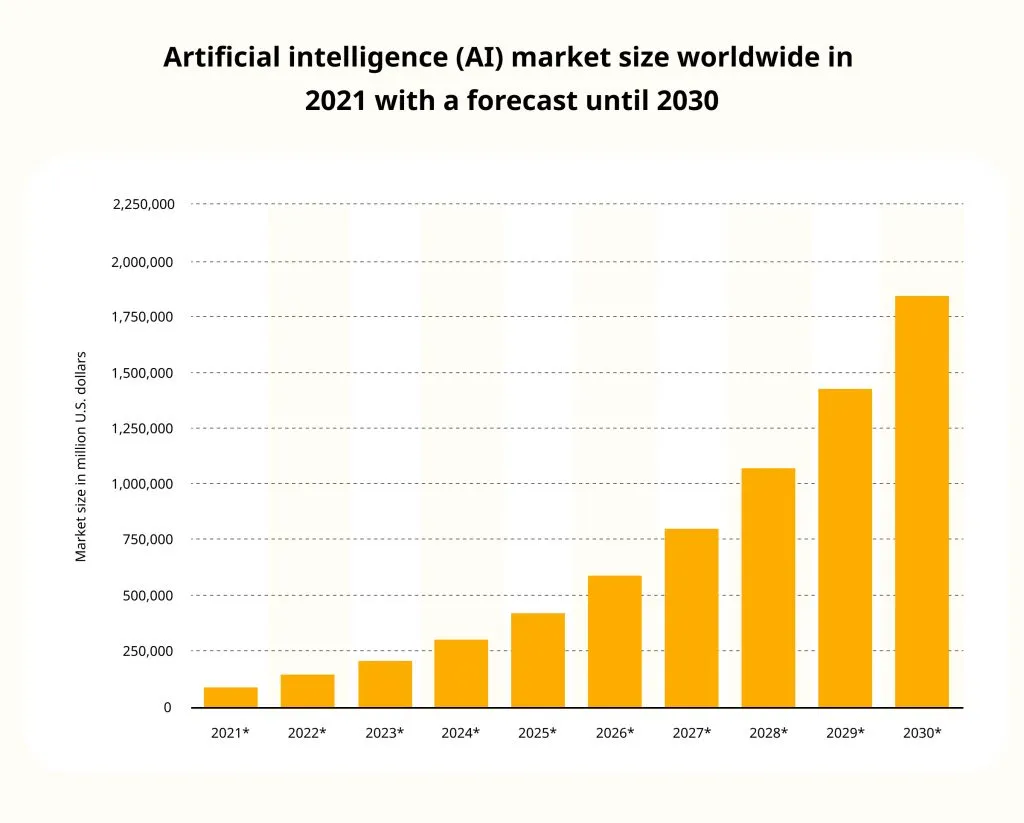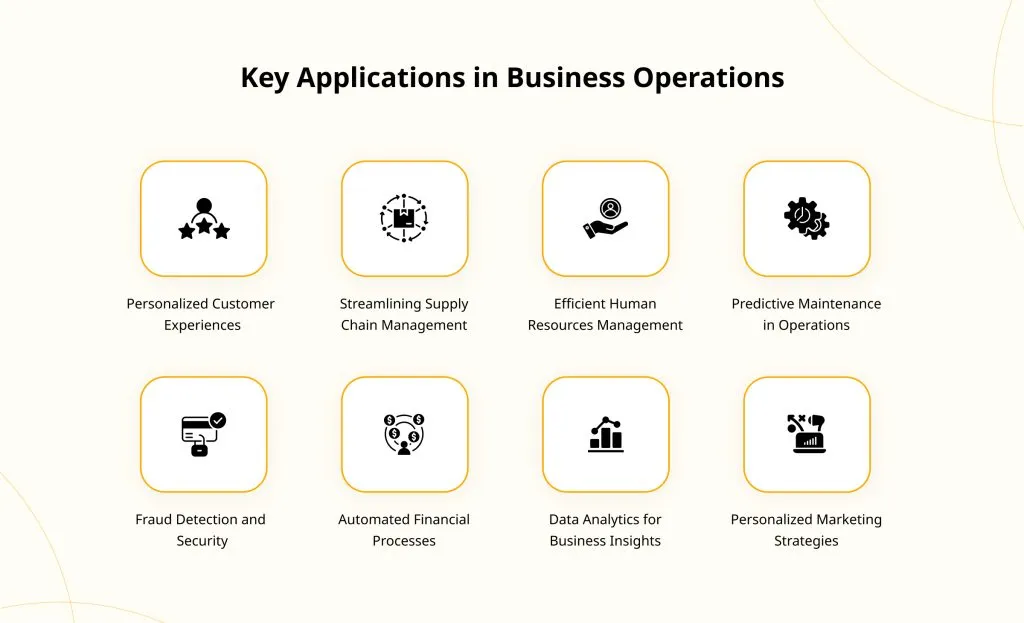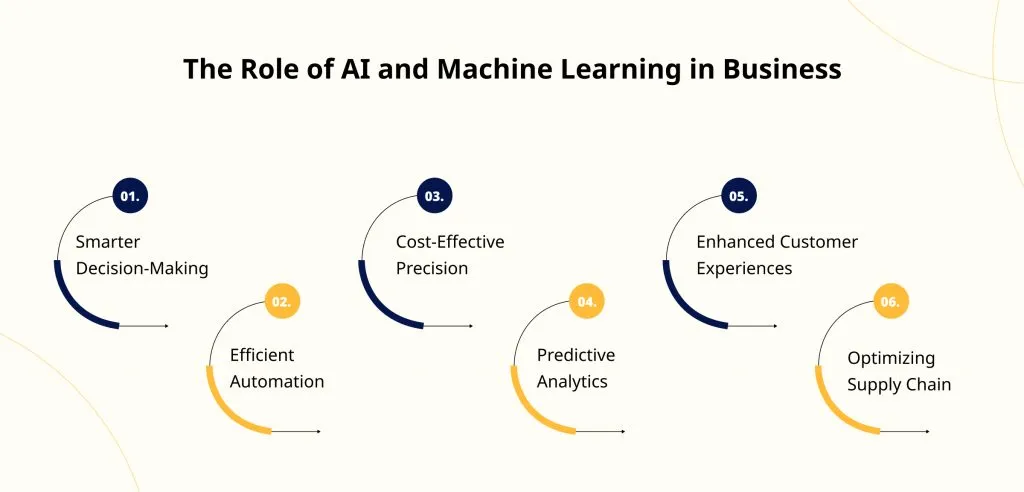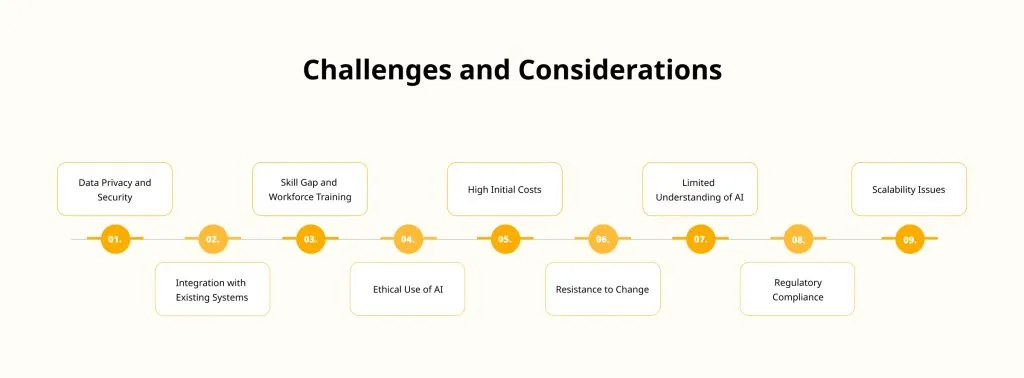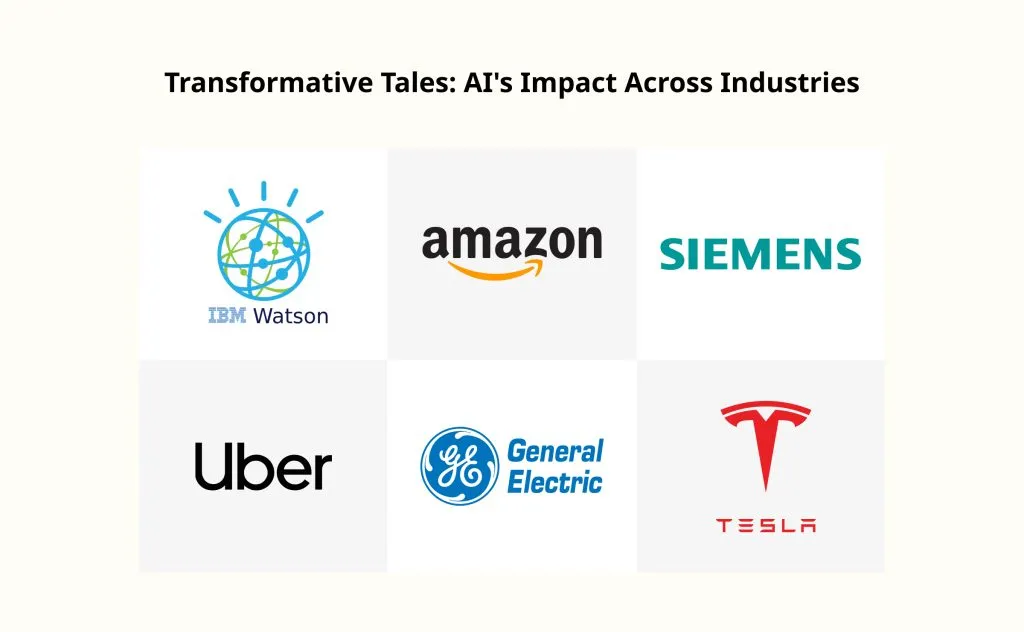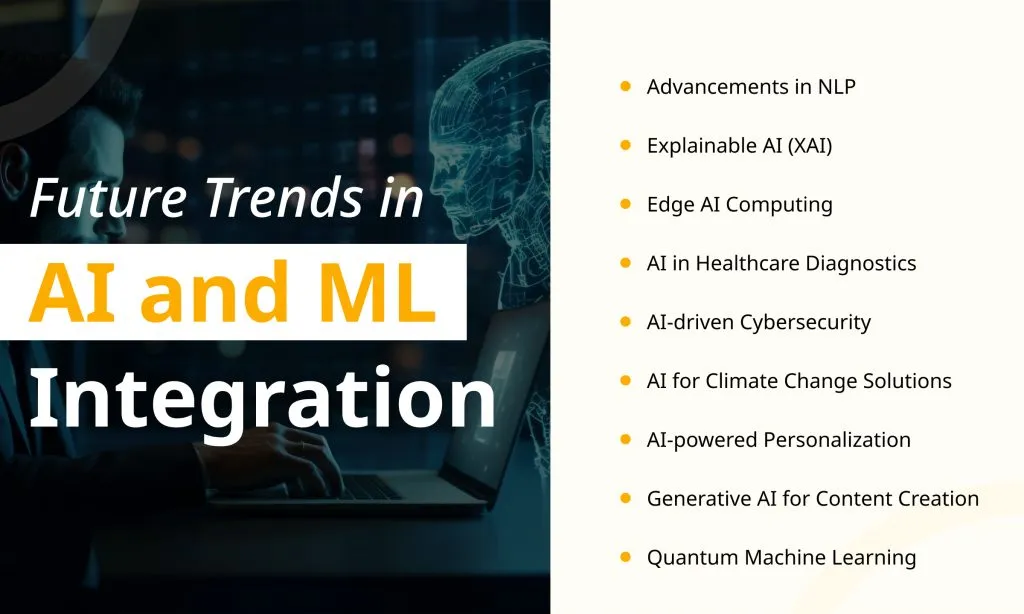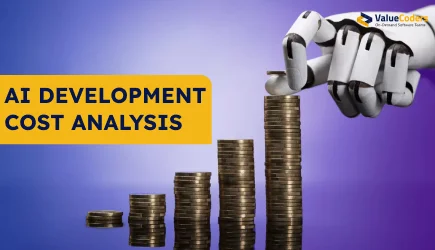How can businesses keep up with the blistering pace of technological innovation and harness the power of Artificial Intelligence?
Any firm not asking themselves that today risks getting left behind tomorrow.
AI and Machine Learning have become critical drivers of efficiency, cost reduction, and value creation across sectors.
Yet many business leaders struggle with questions of where to start, whether AI is affordable, and how to integrate it into existing workflows.
The Next Move Strategy Consulting predicts the market for Artificial Intelligence (AI) is estimated to spike coming decade. Its value of nearly 100 billion U.S. dollars is projected to grow twentyfold by 2030.
So the question arises: What, why, and how do you incorporate AI solutions across essential organizational functions?
Well, to get the answers, you’ll have to continue reading this blog post, where we’ll share how adopting Artificial Intelligence can lead to formidable and diverse business benefits.
The insights cover identifying the best starting points based on your business needs, assessing impacts over time, and scaling adoption.
Let’s find out!
ValueCoders' expert AI and ML services can revolutionize your brand.
Understanding the Basics
As businesses evolve rapidly, understanding the basics of AI and Machine Learning (ML) is essential for staying competitive and future-ready.
Let’s make it simpler for you to understand:
- AI and Machine Learning Integration Strategies: AI and Machine Learning Integration in business involves seamless strategies to incorporate these technologies into daily operations. It’s not just about adopting them but strategically leveraging their power to enhance efficiency and productivity.
- Future of Business Operations with AI and ML: The future of business operations is intricately linked with the integration of AI and ML. These technologies aren’t just trends; they’re transformative forces reshaping how businesses operate. Embracing them positions your business for long-term success.
- AI and Machine Learning Integration: Integration is the key. It’s about embedding AI and ML seamlessly into your existing processes. It’s not a standalone solution but a powerful enhancement to what you’re already doing.
- Machine Learning Development: Machine Learning Development is the process of creating algorithms that enable machines to learn from data. It’s a dynamic field, continually evolving to meet the demands of an ever-changing business landscape.
Choosing the right framework is crucial. Think of top machine learning frameworks as the tools in your ML toolbox.
TensorFlow, PyTorch, and Scikit-Learn are among the top contenders, each with its strengths. Selecting the right one depends on your specific business needs.
Key Benefits of Integration
Unlocking the benefits of AI and Machine Learning (ML) integration into business operations is a strategic move that yields transformative advantages.
Here’s a straightforward breakdown:
1. AI and Machine Learning Integration Strategies: Creating a thoughtful integration strategy is paramount. It’s not just about adopting AI and ML but about seamlessly infusing them into your operations for maximum impact.
2. Future of Business Operations with AI and ML: The future is now, and it’s entwined with AI and ML. Adopting these technologies positions your business at the forefront of innovation, ensuring adaptability and resilience in a dynamic market.
3. Top Machine Learning Frameworks: Choosing the right framework is like to selecting the right tools for the job. TensorFlow, PyTorch, and Scikit-Learn are among the top contenders. Each framework has its strengths, and your choice should align with your specific business needs.
Now, let’s look into the tangible benefits:
- Enhanced Decision-Making: AI and ML empower informed decision-making by analyzing vast datasets and extracting valuable insights.
- Improved Operational Efficiency: Streamlined processes and boosted efficiency through automation, minimizing manual intervention and reducing errors.
- Personalized Customer Experiences: Tailor customer interactions based on predictive analytics, providing customized services that resonate.
- Increased Productivity and Automation: Automate routine tasks, allowing your team to focus on higher-value activities, enhancing overall productivity.
Incorporating Machine Learning models into software applications further amplifies these benefits, fostering a more dynamic and responsive operational environment.
Additionally, leveraging AI and ML frameworks in predictive analytics and decision-making solidifies their role as invaluable assets in shaping a future-ready business landscape.
The key lies in thoughtful integration and strategic application to unlock the full potential of these technologies.
Our expert team ensures a smooth integration that aligns with your business goals.
Challenges And Solutions
Integrating AI and Machine Learning (ML) into business operations can be tricky because it has particular challenges. Let’s look at these pitfalls and explore practical solutions:
1. AI and Machine Learning Integration Strategies: Before getting into challenges, it’s important to reiterate the importance of strategic integration. Thoughtful planning is the first step toward overcoming obstacles.
2. Future of Business Operations with AI and ML: Anticipating future challenges ensures a proactive approach to problem-solving, aligning your business with the dynamic landscape.
3. Understanding the Difference: AI vs. Machine Learning vs. Deep Learning, it’s essential to grasp the basic differences between these terms. AI is the overarching concept, ML is a subset, and Deep Learning is a specialized form. Clarifying these distinctions helps in overcoming misconceptions.
Now, let’s address the challenges and their solutions:
1. Integration Complexity
- Challenge: The intricate nature of AI and ML integration can be overwhelming.
- Solution: Adopt a phased approach, starting with smaller, manageable projects before scaling up.
2. Data Quality and Security Concerns
- Challenge: Data integrity and safeguarding against security threats are primary concerns.
- Solution: The role of Machine Learning in Fraud prevention is crucial. So, implement robust data quality measures and employ encryption protocols. Regular audits help maintain a secure environment.
3. AI Talent Shortage
- Challenge: Finding skilled AI and ML professionals is a common obstacle.
- Solution: Collaborate with top Machine Learning development companies or hire Machine Learning experts to augment your team’s capabilities.
4. Resistance to Change
- Challenge: Employees may resist changes introduced by AI integration.
- Solution: Facilitate comprehensive training programs, emphasizing the benefits and providing ongoing support to ease the transition.
By addressing these challenges proactively, businesses can pave the way for a smoother integration journey, unlocking the full potential of AI and ML in predictive analytics and decision-making.
Partner with ValueCoders to make this transformation seamless.
Steps to Integration
Integrating AI and Machine Learning (ML) into your business operations can be transformative if approached strategically.
Let’s break down the steps to ensure a smooth integration:
1. Assess Business Needs
- Identify areas where AI and ML can add value, considering challenges and operational gaps.
- Pinpoint processes that could benefit from automation and predictive analytics.
2. Choose the Right Frameworks
- Explore popular AI and Machine Learning frameworks such as TensorFlow or PyTorch.
- Select frameworks based on your business requirements, ensuring compatibility and scalability.
3. Integrating Machine Learning Models Into Software Applications
- Develop a plan for seamlessly incorporating machine learning models into your existing software applications.
- Ensure that the integration enhances functionality without causing disruptions.
4. Training and Skill Development
- Allocate resource in training programs for your team, or consider hiring machine learning experts.
- Build internal capabilities to understand, manage, and leverage AI and ML effectively.
5. Pilot Projects for Testing
- Initiate small-scale pilot projects to test the integration’s feasibility and impact.
- Gather feedback and address any issues before scaling up.
Also Read: How to Integrate IoT with Wearables to Enhance Fitness & Health Tracking
6. Machine Learning for Business Optimization
- Leverage machine learning specifically for business optimization, focusing on efficiency and productivity improvements.
- Continuously monitor and tweak models to align with evolving business needs.
7. AI Solutions for Operational Challenges
- Identify specific operational challenges and explore AI-driven solutions.
- Implement AI solutions to address and overcome these challenges systematically.
Remember, successful integration is an ongoing process.
Regularly assess performance, gather feedback, and stay attuned to emerging technologies to keep your business operations optimized and resilient.
AI and ML can become powerful tools for addressing operational challenges and driving efficiency with the right approach.
ValueCoders has a team of experts to support you with AL & ML adoption.
Real-world Applications
With the rising integration of Artificial Intelligence (AI), many businesses are going through rapid transformation.
At the forefront of this revolution are leading companies leveraging AI to redefine operations and foster innovation across various sectors.
Here’s a glimpse into how AI is reshaping industries:
1. Amazon harnesses AI to tailor product recommendations, streamline supply chains, and thwart fraudulent activities. Bank of America employs AI in the finance sector for customer interactions, fraud detection, and investment management. Healthcare sees the prowess of IBM Watson in diagnosing diseases, creating personalized care plans, and pioneering new treatments.
2. Siemens utilizes AI to predict equipment failures, enhance production processes, and bolster quality control. Meanwhile, Uber relies on AI in transportation to forecast traffic patterns, optimize routes, and efficiently match riders with drivers.
3. IBM Watson is a game-changer in healthcare. Harnessing machine learning in predictive analytics and decision-making, Watson analyzes medical images with superhuman precision. Collaborating with doctors, Watson personalizes treatment plans based on your unique genetic makeup, paving the way for more effective therapies and potential life-saving breakthroughs. IBM Watson exemplifies the power of technology, seamlessly integrating with medical expertise to revolutionize patient care.
4. Uber’s AI, powered by seamless AI and machine learning integration, transcends being a simple ride-finding tool. It transforms into your traffic strategist, dynamically analyzing real-time traffic patterns. This intelligent system predicts congestion, offering a ride and a meticulously planned journey.
It’s more than finding the nearest driver; it’s a smooth coordination of AI and machine learning, ensuring efficient routes that save you invaluable commute minutes. Uber’s commitment to AI and machine learning integration promises to make Uber seamlessly blend technology and human convenience, creating a smooth urban travel experience.
Also Read: The Role Of Artificial Intelligence In The Financial Sector
These instances merely scratch the surface of AI’s transformative capabilities. The benefits of integrating AI into business operations are extensive:
- Increased Efficiency: AI takes on repetitive, time-consuming tasks, allowing human resources to concentrate on strategic endeavors.
- Improved Decision-Making: By analyzing vast datasets, AI uncovers patterns and trends, empowering businesses to make informed decisions across various domains, from product development to marketing strategies.
- New Products and Services: AI opens the door to novel offerings. AI-driven chatbots provide round-the-clock customer support, while recommendation engines enhance the customer experience by suggesting products tailored to individual preferences.
As AI grows, its influence on businesses will get stronger. Those who can smoothly blend AI, put Machine Learning models into software apps, use AI models for apps, and tackle operational issues with AI solutions will likely succeed in the coming years.
AI isn’t just a tech tool; it’s a powerful asset. If used wisely, it guides businesses into a future full of exciting possibilities.
Summing Up
In conclusion, integrating AI and Machine Learning (ML) is not just a trend but a pivotal strategy for businesses striving to thrive in the evolving landscape.
As businesses venture into AI and ML, partnering with an Artificial Intelligence (AI) Services Company like ValueCoders becomes a strategic move.
The impact of AI and ML on business efficiency is profound, with Machine Learning Solutions offering optimization and innovation.
Exploring AI and ML in mobile app development opens doors to novel possibilities while integrating Machine Learning Models for business is a step towards future-proofing operations.
Recognizing the transformative potential, the dynamic duo of AI and ML is set to reshape business landscapes, offering unprecedented opportunities for those who embrace their strategic potential.
The future belongs to those who harness the power of AI and ML for business optimization and sustainable growth.


